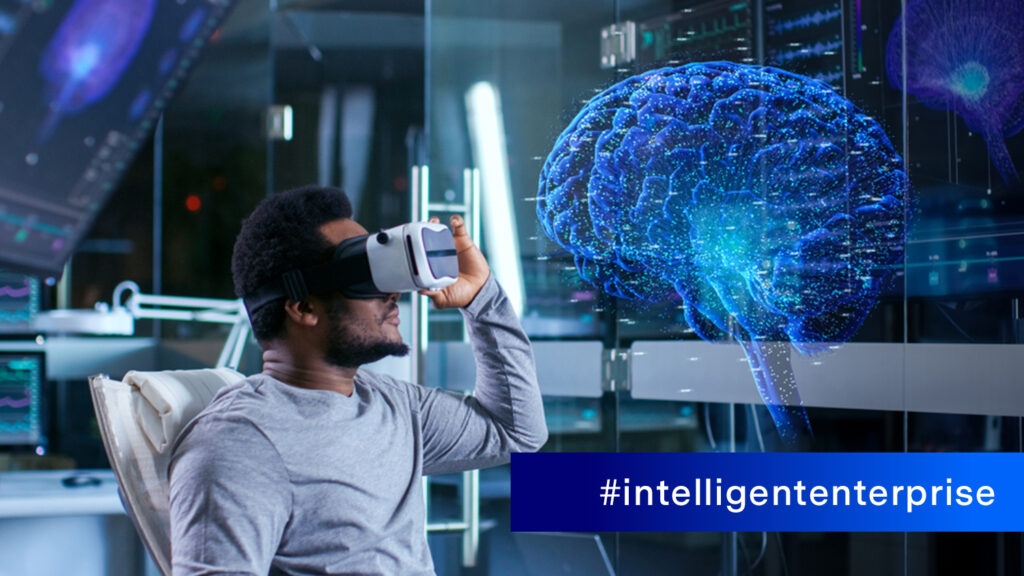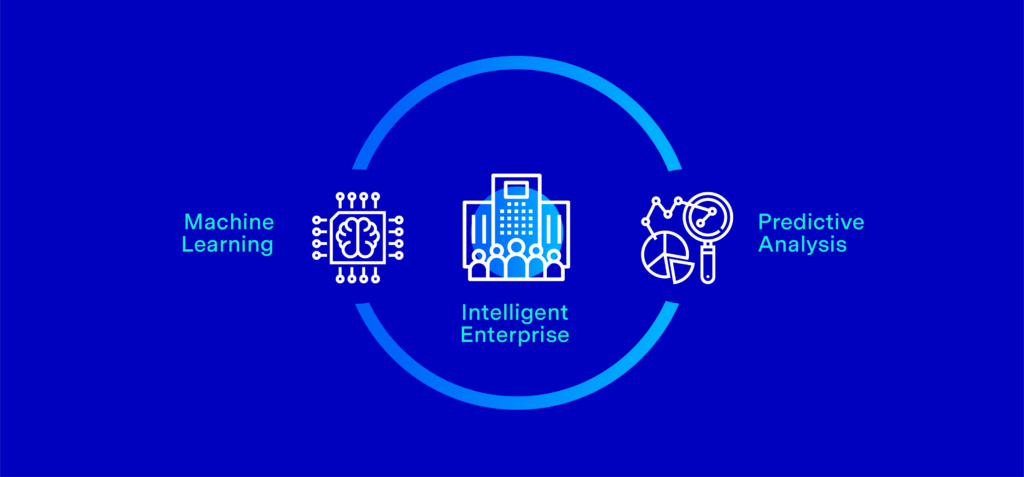Big Data, Internet of Things (IoT), Reality Technologies, Artificial Intelligence – companies have an increasing array of digital means to help them organize internal processes, business models and strategies in a smarter way. With the initiatives that are being taken, investments in digital technologies of the future are growing rapidly.
According to a study conducted by the International Data Corporation (IDC), around 1.25 trillion US dollars in 2019 alone will be invested worldwide in products and services facilitating digital change. For the period between 2017 and 2022, the IT market research institute predicts an average annual growth rate of 16.7 percent.
Companies around the world increase the IT investments in order to evolve into the Intelligent Enterprise. (Source: IDC)
This trend is aided by the need to keep pace with competition. In many industries, digital technologies are no longer sufficient to help you stand out from the competition. Digital technologies are in fact absolutely essential for survival of companies. The decisive question is not whether you’re investing in digital technologies – that’s a given. The crucial issue is how your company will fully reap the benefits of your investments in digitalization and develop a vision of the Intelligent Enterprise.
Data Is the Key to the Intelligent Enterprise
For many companies today, a majority of the IT budget is spent on ensuring the ongoing operation of existing digital infrastructure. In addition, numerous internal policies and regulations often hinder technology innovation while at the same time the management team is unable to prioritize investment in future technologies. In this process, an important asset of digitalization remains largely untapped: data.
Although the importance of big data has been recognized for years, many companies have a large backlog of data management, analytics and data-based applications. This is certainly due in part to the fact that for a long time there was a lot of hyped information and sometimes empty promises in connection with big data, and these were not aligned to business goals. Today, many decision-makers continue to struggle on how a data-driven and connected Intelligent Enterprise can completely transform business processes and customer relationships in the future.
How Data Will Change Our Work in the Future
Our everyday lives are driven by data. We use smartphone applications containing intelligent algorithms to receive real-time traffic information along with predictions about the quickest routes. The restaurant app on our smartphone provides access to customer ratings and recommendations. When shopping at our favorite online shop we benefit from the recommendations of the analytics engine and when we proceed to the checkout, we pay digitally and naturally expect that all systems that we use will work together in a seamless and user friendly manner.
The Intelligent Enterprise must be based on these experiences from our digital life. The intelligent handling of big data must be implemented in the company in such a way that our work productivity can be raised through the use of smart systems, where intelligent machines relieve us of tedious business processes and provide us with valuable information. This creates opportunity for following types of tasks:
- Prioritization of workflows based on data-driven insights
- Automated resolution techniques for less complex problems
- Automated processing of recurring tasks based on intelligent and adaptive procedures
- Rapid analysis of large amounts of data to identify hidden rules and patterns that can help you make more informed business decisions
How PAML Technologies Drive Digital Change
The most important technologies for building an Intelligent Enterprise are Predictive Analytics and Machine Learning (PAML). They enable flexible business processes, provide information for decisions and deliver an unprecedented level of insight on customers.
Machine Learning is the core application for the use of artificial intelligence (AI) in business practice. The method works with self-adaptive algorithms that systematically collect data and develop models based on this data, which, in turn, can be used to make predictions or identify patterns. Machine Learning is a solution-oriented application of artificial intelligence: based on identified patterns and regularities, it is possible to automatically change existing business processes and adapt them to the current situation.
Predictive Analytics is a statistical method that uses various analytic functions such as Machine Learning, data mining and real-time scoring. It is aligned with a narrowly defined business objective. For example, this could be the probability of certain customer behavior or the functional interval of a technical system. Relevant data is collected and converted into a statistical model that can be used to make predictions. By supplying new data and comparing it with previously made predictions, this process gets better and better each time. This way, Predictive Analytics enables companies to make sound predictions about future developments in important business areas.
Machine Learning and Predictive Analytics work hand in hand – they are fundamental enablers for building the Intelligent Enterprise.
What Does the Intelligent Enterprise of the Future Look Like?
The transition towards the Intelligent Enterprise is a leap into a new digital era for every company. In many organizations, lots of proprietary IT solutions that are either not compatible or barely compatible with each other have become established across business units. At the same time, a large amount of data often lies idle in isolated systems and it is often being integrated in narrowly defined processes. For this reason, if you want to establish an Intelligent Enterprise, it is essential that you introduce a new evolutionary cycle in the company.
The good news is that smart technologies such as Machine Learning and Predictive Analytics give every player the ability to gradually move business processes to a more data-driven approach. Companies no longer have to wait for a big technologicy solution. Instead, they have the power to set strategic priorities and can establish an agile culture that transforms the innovative power of digital technologies into better products, services and processes.
In addition to adopting a strictly customer-centric view of the market and having highly motivated employees with an affinity for all things digital, you cannot achieve this without external help. Groundbreaking technologies cannot always be developed, maintained and expanded in-house. For this reason, the Intelligent Enterprise also stands for a new era in which it is becoming increasingly crucial for companies to establish a trustworthy network of cooperation with the right strategic partners.
Allgeier accompanies you as a partner in the transformation of your company into an Intelligent Enterprise. Get in touch!
Umang Garg, the lead author of this blog post, is Director and Global Practice Leader at Nagarro. You can follow Umang on LinkedIn. Anurag Sahay, Michel Dorochevksy and Damianos Soumelidis of Nagarro are contributing authors of this blog post.


